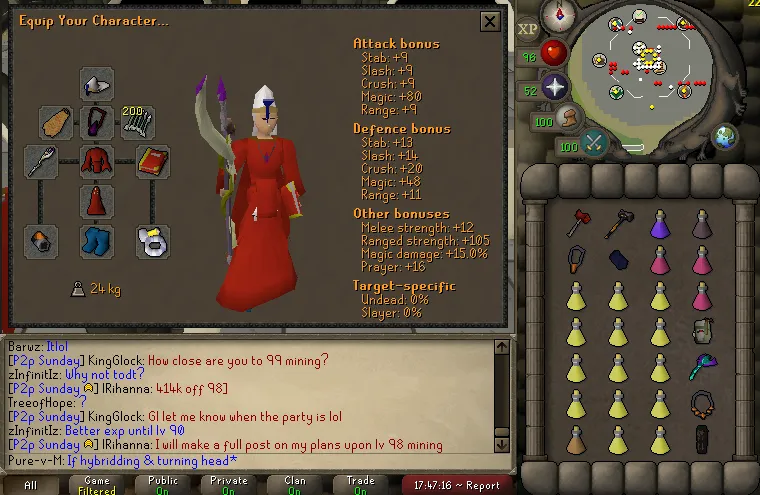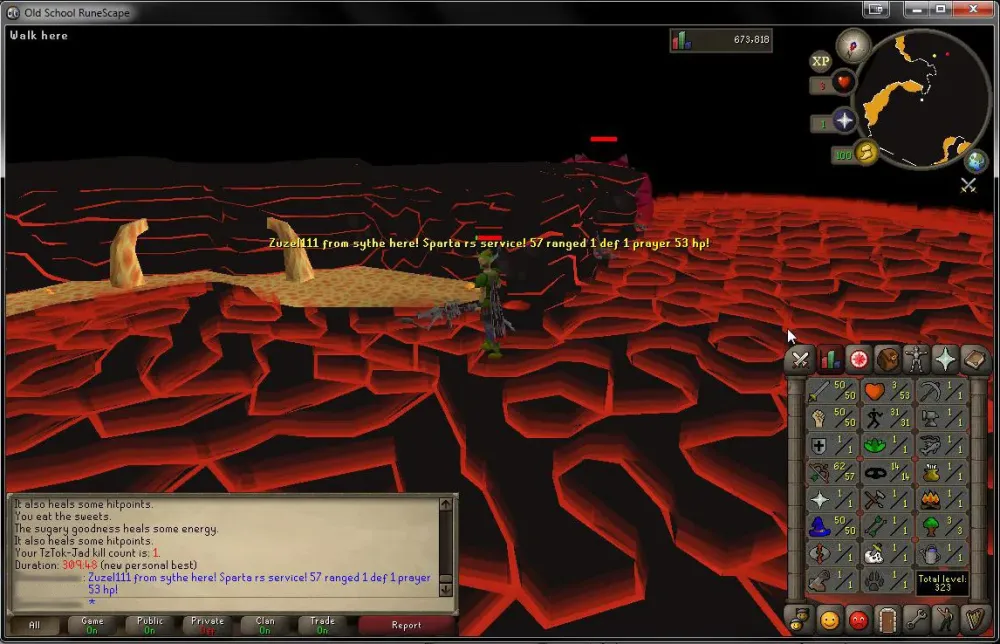Your cart is empty
OSRS Fire Cape Service Ban: Risks, Rules, and What You Need to Know

Warning: Undefined variable $post in /home/osrsmoneymaking.guide/public_html/wp-content/themes/kadence/functions.php on line 391
Warning: Attempt to read property "ID" on null in /home/osrsmoneymaking.guide/public_html/wp-content/themes/kadence/functions.php on line 391
Old School RuneScape (OSRS) players know the Fire Cape as one of the game’s most iconic rewards, earned by defeating TzTok-Jad in the TzHaar Fight Caves. For many, it’s a rite of passage—a badge of skill and perseverance. But not everyone has the time, patience, or expertise to conquer Jad themselves. That’s where Fire Cape services come in: third-party providers or individuals offering to complete the Fight Caves for you, typically for a fee. However, a burning question looms over this practice—can using an OSRS Fire Cape service get you banned? In this blog post, we’ll dive deep into the risks, Jagex’s rules, ban statistics, safer alternatives, and everything else you need to know before outsourcing your Fire Cape.
Jagex, the developers of OSRS, have clear rules governing account behavior, and Fire Cape services sit in a gray area that’s worth unpacking. Let’s break it down.
Account Sharing: Against the Rules
According to Jagex’s official Terms of Service, account sharing is explicitly prohibited. The rule states that each player must maintain control of their own account and not allow others to access it. When you hire a Fire Cape service, you’re typically handing over your login details to a stranger—or at least letting them play on your behalf via remote access tools like TeamViewer. This alone violates Jagex’s policies, making it a bannable offense in theory.
Real-World Trading (RWT) Connection
Many Fire Cape services involve payment, whether in real-world currency (e.g., USD via PayPal) or in-game gold (GP). Jagex classifies paying for in-game advantages—like someone completing content for you—as Real-World Trading, another serious violation. RWT bans are more strictly enforced than simple account sharing, especially when money changes hands outside the game.
Enforcement: Lax or Targeted?
While the rules are clear, enforcement isn’t always consistent. Jagex has historically focused more on high-profile cases—like Infernal Cape services—than Fire Cape ones. In 2020, they removed over 1,692 Infernal Capes from accounts caught using services, proving they can and will act when evidence is strong. Fire Cape bans, however, are less documented, suggesting either lower priority or harder detection. That said, the risk remains—especially if you’re flagged by other players or caught via IP tracking.
Risks of Using a Fire Cape Service

Beyond Jagex’s rules, there are practical dangers to consider when using a Fire Cape service. These risks can hit your account, wallet, and peace of mind harder than Jad’s infamous stomp.
Ban Risk: How Likely Is It?
No official statistics exist on Fire Cape service bans, but community forums like Reddit and Sythe offer anecdotal insights. Players report that bans are rare unless the service provider uses a flagged IP (e.g., one tied to botting) or you’re reported by someone who knows you outsourced the cape. Services like Sparta.rs claim “no bans” in thousands of completions, often by playing manually and using VPNs to mask their location. Still, rare doesn’t mean impossible—Jagex could tighten enforcement at any time.
Account Theft: A Real Threat
Handing over your login details is like giving a stranger the keys to your RuneScape kingdom. Scams are rampant in the black market. A shady provider might strip your bank, transfer your gold, or even change your password. Trusted services with vouches (e.g., on Sythe or PlayerAuctions) reduce this risk, but it’s never zero. Even remote access methods aren’t foolproof if the provider logs your details secretly.
Supply Overkill: Hidden Costs
Some services demand excessive supplies—think 500+ purple sweets or a maxed-out blowpipe—then pocket the leftovers. This inflates the real cost beyond the advertised price. Reputable providers, like LuckyCharmGold, list exact requirements (e.g., 2K darts, 25% Zulrah scales) to avoid this, but it’s a red flag to watch for with less transparent sellers.
How Jagex Detects Fire Cape Service Use
Wondering how you’d even get caught? Jagex has a few tricks up its sleeve to spot suspicious activity tied to Fire Cape services.
IP Address Tracking
When someone logs into your account from a different location, Jagex can see the IP change. A sudden jump from, say, New York to Indonesia might raise flags, especially if that IP is linked to known service providers or bot farms. Providers counter this with VPNs or remote access, keeping the IP consistent, but Jagex could still detect anomalies in login patterns.
Player Reports
Bragging about your outsourced Fire Cape in-game or on social media? A jealous rival might report you. While Jagex doesn’t act on every report, credible evidence—like screenshots or Discord logs—could prompt an investigation. This is why discretion is key if you go this route.
Behavioral Analysis
Jagex’s anti-cheat systems might analyze playstyle differences. If you’re a casual player who suddenly aces the Fight Caves with pro-level precision, it could trigger scrutiny. Manual services mimic human play to dodge this, but it’s another layer of risk to consider.
Safer Alternatives to Fire Cape Services
If the ban risk or ethical gray area turns you off, there are legit ways to snag that Fire Cape without breaking rules—or your bank.
Do It Yourself: A Rewarding Challenge
The classic route: tackle the Fight Caves solo. With 75+ Ranged, 43+ Prayer, and decent gear (e.g., blowpipe or crossbow), it’s very doable. YouTube guides break down every wave, and practice makes Jad’s prayer switches second nature. Plus, the satisfaction of earning it yourself is unmatched—no ban worries, just pure pride.
Hire a Coach, Not a Service
Some platforms, like PlayerAuctions, offer coaching instead of account play. A pro guides you through the caves in real-time, teaching you the ropes without touching your account. It’s slower than a service but 100% rule-compliant and still gets you the cape.
Buy a Pre-Made Account
Rather than risking your main, buy an account with a Fire Cape already unlocked. Sites like Sparta.rs sell low-level accounts with capes attached. It’s a workaround that avoids sharing your personal account, though it still skirts RWT rules if paid with real money.
Should You Use a Fire Cape Service? Pros, Cons, and Final Thoughts
Deciding whether to use a Fire Cape service boils down to weighing rewards against risks. Let’s sum it up with a clear breakdown.
Pros of Fire Cape Services
- Time-Saving: Get the cape in hours, not days of failed attempts.
- Accessibility: Ideal for players lacking skill or gear for Jad.
- Low Ban History: Fire Cape bans are less common than Infernal ones.
Cons of Fire Cape Services
- Ban Risk: Violates Jagex rules, with potential account loss.
- Scam Potential: Untrustworthy providers could steal your stuff.
- Misses the Journey: No personal achievement or skill growth.
Comparison Table: Service vs. Solo
| Aspect | Fire Cape Service | Solo Attempt |
|---|---|---|
| Time | 1-4 hours | Days/weeks of practice |
| Cost | $10-$20 or 5M-20M GP | Free (just supplies) |
| Risk | Ban/scam potential | None |
| Reward | Cape, no effort | Cape + pride |
Final Verdict
Using an OSRS Fire Cape service is a gamble. While bans seem rare, the possibility lingers—along with scams and rule-breaking guilt. If you’re dead-set on it, stick to vetted providers with strong reputations (check Sythe or Trustpilot reviews) and use remote access to minimize IP risks. Better yet, take the plunge yourself or hire a coach—it’s safer, legit, and way more satisfying. The Fire Cape’s lava-hot glory is sweetest when you’ve earned it through your own sweat and prayer flicks.
Have you used a Fire Cape service or beaten Jad solo? Share your story below—we’d love to hear your take!
Warning: Undefined variable $post in /home/osrsmoneymaking.guide/public_html/wp-content/themes/kadence/functions.php on line 391
Warning: Attempt to read property "ID" on null in /home/osrsmoneymaking.guide/public_html/wp-content/themes/kadence/functions.php on line 391

